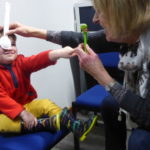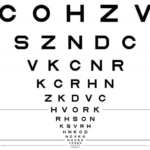At the Infant Vision Laboratory, University of Reading, we study the causes of many children’s vision problems. We research visual development and how people keep their eyes lined up and focused for things at different distances. Our findings challenge some conventional theories and they highlight the need for a re-think of the underlying mechanisms. If we understand how things work better, we can make treatments more effective.
The technical words are “accommodation” (focusing) and “convergence” (keeping the eyes lined up). We all use these processes to keep our eyes straight, and if they go wrong, it can lead to a squint, eye strain or double vision. Our particular interest is how accommodation and convergence work together. It sounds fairly simple, but it actually involves many different brain and eye systems all working and developing in parallel. Things can easily go wrong and children then need treatment from orthoptists, ophthalmologists and optometrists.






